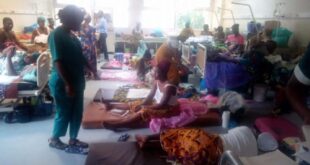Experts have prescribed family planning as an answer to the troubling spate of teenage pregnancies and unsafe abortions in the Upper East region.
The authorities, speaking to journalists in Bolgatanga, the Upper East regional capital, where a week hardly passes without underage schoolgirls confirmed pregnant at health facilities, say it is time the girls in the region were encouraged to seek thorough family planning services.
This, they maintained, would not only save especially schoolgirls the troubles of unwanted pregnancies and unsafe abortions but would also help curb the spread of HIV/AIDS among other sexually transmitted infections and prevent teenage mothers and their born-too-soon babies from ending up in wild streets.
“It’s very serious. These days, you are at the clinic, there is no week you will not get a 14, 15-year-old girl becoming pregnant in JSS 1, JSS2. It’s becoming a problem. Those pregnancies are not wanted. Some of them take concoctions to abort; then, at the end of the day they lose their lives. Though we stress on abstinence, some of them are really sexually active. Do we leave them like that?
“They are not married, and most of them don’t even know those who impregnate them. People think girls are too young to go into family planning. But are they not too young to have sex, too? They are too young to have sex but they are into sex. So, why don’t we encourage them to go in for family planning so they can continue their education or whatever trade they are learning? If we don’t take care, their babies would end up on the streets. Those babies would not get education,” Mary Azika, a senior midwife and renowned radio health educator in the region, told newsmen in Bolgatanga at the close of a seminar organised by the Upper East Regional chapter of the Ghana Coalition of NGOs in Health.
Why teenagers avoid condoms
The ever-present cases of teenage pregnancies in the Upper East Region often come in breathtaking waves with 165 candidates of the Basic Education Certificate Examination (BECE) alone said to be pregnant in the region in 2014 and 2015 combined.
Whilst the latest figures of pregnant schoolgirls below the BECE class in the region are yet to be declared by the Ghana Education Service (GES), the number of BECE candidates identified this year to be expecting babies in the region is reportedly so frightening that the Upper East Regional Education Directorate has, to the unreserved displeasure of civil society organisations, strongly refused to disclose it to the press.
Meanwhile, development watchers have pointed at what they describe as pointless stigma generally attached to the possession of condoms in the region as a major reason teenagers are shying away from contraceptives. The stigma, they observed, is deeply rooted in culture and in religion.
“Some of the adolescents want to use it, but the problem is access. They ask: ‘Where do I get it and who would not see me when I’m buying it?’. They have been educated on the importance of condom. As part of our programmes, we’ve made them aware that if you find it on somebody doesn’t mean that the person is a bad person. The person may just be protecting himself or herself in case of any emergency,” Khadija Hamidu, the Nabdam District Project Supervisor for Friendship Love and Sexual Health (FLASH), a programme introduced by the Youth Harvest Foundation Ghana (YHFG) so far in three districts that also include Talensi and Bongo to curb teenage pregnancies, told Starr News.
She added: “Culture and religion are the bases of the stigma. Because of religious affiliations, it is believed that those who buy condoms or have condoms on themselves are bad. In cultural terms, those who use it also are seen to be immoral and irresponsible. They give you all sorts of names. Imagine if a parent sees it on a child. What would just spring to mind? Imagine if a teacher finds it in a student’s bag, in a class, or under the desk. Immediately, they would scream.”
Condom machines limited and broken down
The condom-vending machines (CVMs) installed in the region are awfully few with just 17 of them to a population of over million people.
The machines also have consistently broken down as some faceless individuals, rather than insert the required ten-pesewa coin into the machines for 3 pieces of condom in return, dubiously slot in either coins used when Ghana was called Gold Coast or the heads of roofing nails flattened with a hammer.
Whilst some of the 13 municipalities and districts in the region do not have the machines, a number of the few ones installed so far are crashed again, just months after the last routine maintenance.
Officials of the Ghana AIDS Commission disclosed to Starr News Tuesday they intended to carry out another maintenance exercise on the machines anytime soon, adding that efforts were being made at the commission’s headquarters to procure more of the machines to reach particularly the areas currently without the devices.
In the intervening time, the Ghana Coalition of NGOs in Health says the alarming spate of juvenile childbearing in the region calls for an emergency stakeholders’ conference to stem the tide of unsafe abortions and the disquieting prevalence of infections transmitted through unprotected sex.
Source: Starrfmonline.com
 Pink 96.9 fm your life, your music
Pink 96.9 fm your life, your music





